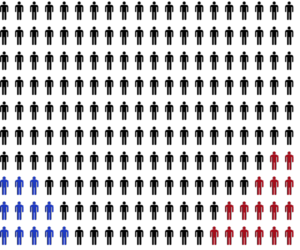 In the 1970’s, conservative Christians formed an organization called The Moral Majority, the point of the “majority” part of the name being their conviction that they and those like them formed a majority of Americans, whose wishes were being disregarded by the liberal (minority) establishment. The name was also a play on the “Silent Majority,” coined by Richard Nixon to refer to those Americans (again, allegedly in the majority but overlooked by the liberal mainstream media) who were opposed to the countercultural protests of the 60’s.
In the 1970’s, conservative Christians formed an organization called The Moral Majority, the point of the “majority” part of the name being their conviction that they and those like them formed a majority of Americans, whose wishes were being disregarded by the liberal (minority) establishment. The name was also a play on the “Silent Majority,” coined by Richard Nixon to refer to those Americans (again, allegedly in the majority but overlooked by the liberal mainstream media) who were opposed to the countercultural protests of the 60’s.
Partly, these claims of majority status were tactical maneuvers by conservative leaders playing politics, but they gained their power from the fact that most of their followers genuinely believed them.
Recently, I’ve seen a lot of posts by progressive friends in which the underlying assumption is that the American people are basically progressive, and the only thing stopping us from having the progressive society we want is a corrupt Establishment. But this doesn’t square with the actual political demographics of this country.
Everybody wants to think of themselves as the majority. I suspect it’s partly because they find their own views so compelling, they can’t believe that many others could hold the opposite views. And if the vast majority of your neighbors, co-workers, and Facebook friends all agree with you, it can seem like the whole country does.
One of the arguments progressives make for the idea that we’re all really progressive is to point to survey results showing that most Americans agree with various progressive stances, like the threat of income inequality or climate change, etc. However, the problem with such surveys is that they ask their questions in such broad terms. Once you start becoming more concrete, however, you start losing support.
Here’s a survey showing that 65% of Californians are in favor of single payer healthcare, for example. 65% is great! However, this is just for liberal California, and 35% opposed is still a significant number, and finally, when they added taxes to the question, the number suddenly plunged to 43%. And we aren’t even talking about a specific plan yet. Nor are we giving the opposition a chance to make their counterarguments against it.
On the other hand, that 65% is not completely insignificant. Not every idea can get 65% support, even in its purest form. What this means is that, in the area of health care, there is a potential “there” there, if we can just bridge the gap between the platonic ideal of the naked survey question and the real world of people and politics. But these bridges are hard to build, and there’s a rival contractor trying to build his own bridges while obstructing our work on our own.
This has been a “Politake,” a brief take on politics by Freeman Ng.
